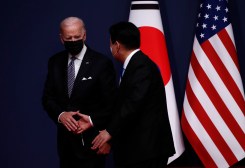DHS putting out contracts ‘within 10 days’ of verbal pitch

The Department of Homeland Security’s Science and Technology Directorate is using new acquisition authorities to move government contracting at startup speeds, inking some deals within 10 days of a brief verbal pitch, a senior DHS official said.
“We’ve put contracts in place in as little as 10 days,” Douglas Maughan, head of the directorate’s Cybersecurity Division told the FedScoop Federal Cybersecurity Summit, sponsored by Hewlett-Packard Enterprises.
He said that the “Other Transaction” authorities the department was using were “Innovative ways to reach a set of customers who never would think of trying to sell to the government.”
Speed is paramount
“We’re excited about it,” he told FedScoop in an interview following his panel last week. “It’s government at startup speed.”
That speed is “paramount,” he explained.
“It’s not just us at DHS, we the government haven’t done a very job of working with startups,” he said. “Startups want to help…but they’ve told us … if you can’t keep up the speed, we won’t come work with you.”
The snail-like pace of the traditional acquisition process has proved fatal to startups in the past, he added.
He said a great deal of his work was educational — on both ends of the pipeline.
“The startup community has very little understanding of DHS,” he said, “I need to educate these guys who are going to supply solutions.”
[Read more: DHS uses new $20M acquisition tool to entice startups]
In December, DHS published its first Other Transaction Solicitation, or OTS, inviting 10-page written applications for four-phase early-stage research and development funding — for Internet of Things cybersecurity technologies.
Each phase — prototype development, further prototype development, pilot testing and operational field testing — lasts three to six months and can be worth up to $200,000 to each awardee.
De-risking start-up technology
Maughan said they had field-tested the plan before putting into practice. . The funding typically goes to companies before they get Series A financing, “so what we’re doing is de-risking some of this technology for them, while getting it for the government.”
Under the law, awardees can’t hold a government contract in the last year worth more than $500,000, so it’s “very suited for non-traditional performers who’ve never done any business with the government,” said Maughan.
He said DHS had received 45 10-page applications. “The difference maker is, if I like your [initial application], I can bring you in for an in-person pitch, you don’t have to write a 30-page proposal … for a startup company that’s golden.”
Verbal pitching
The 30-minute in-person pitch meetings — a 15 minute pitch, followed by 15 minutes of questions — are almost unique in government, although GSA is using them for the new category of “highly adaptive cybersecurity services” it’s added to Schedule 70.
They’re also, Maughan insisted, completely legal and ethical. “The [Federal Acquisition Regulations] don’t say [an application] has to be written … As long as everyone gets the same questions [in a verbal pitch meeting] it’s [a] fair and open [contest]” — the legal requirement for a contract award.
DHS invited nine of the 45 applicants in for pitch meetings, said Maughan, and funded five of them.
Another unique feature of the process, he said, was the role of the eventual consumer.
“We have our operational guys working hand-in-hand with them” through the R&D process. “They’re the consumers” who will eventually get to use the new technology.
“We’re the marriage broker between the startup community and the operational guys” in DHS component agencies like U.S. Customs and Border Protection.
Asked at his panel whether he thought the OTS would be a model for other government agencies, he replied: “We’ve funded five companies … [and] we’ll keep you posted on how it goes.”






